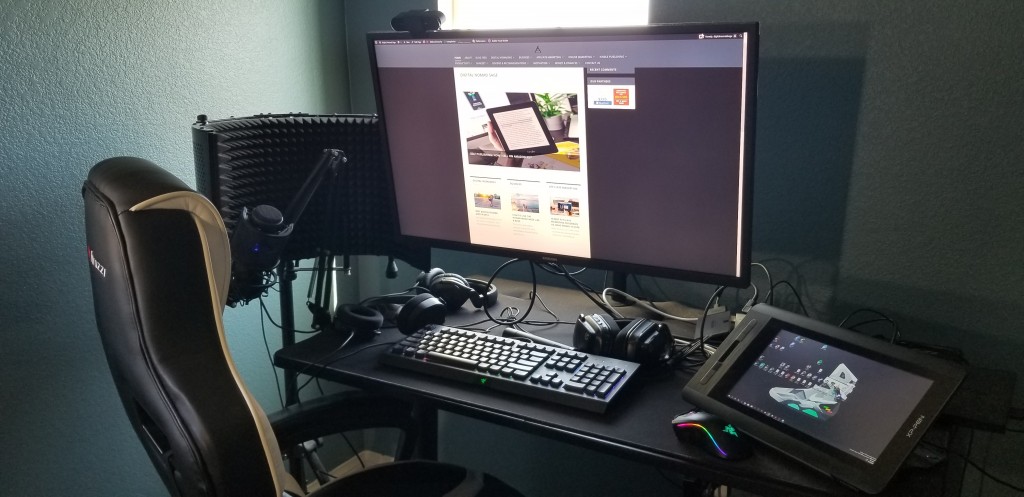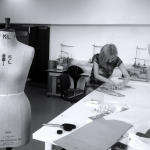
Interview with Digital Nomad Sage, an entrepreneur and UX consultant
How did you get started with remote work?
I had just come back from teaching abroad in South Korea and was applying for jobs in 2015. I had a really hard time because I was overqualified for many jobs with a Masters degree, and I lacked the experience to get entry-level jobs.
I tried studying Web Development but quickly lost interest since I’m not really good at coding. I came across Youtube videos about Amazon FBA, so I became a Fulfillment by Amazon Seller for pet supplies, but that didn’t work out.
My former Japanese language professor saw my struggles and decided to take me under his wing in 2017 and hired me into his UX company. Thanks to him, I have about two years of experience in UX Research working remotely!
My primary job is as a UX Consultant assisting my boss with UX Research.
Read 114 answers from other remote workers
What are you working on?
I’m working on many things at the moment. I started a Kindle Publishing business late last year and have been selling e-books on Amazon. I love it because I didn’t have the inventory/customer issues that I had with Amazon FBA.
It’s truly passive because most of the hard work is in the content creation that you do in the beginning.
I’m also working on my blog, Digital Nomad Sage. I saw a niche opportunity there and wanted to teach others how to start an online business and how to live the digital nomad lifestyle.
Although it’s also an Affiliate Marketing project of mine, the main purpose is to mostly give free content through blogs to help people out.
I want to influence others to become digital nomads and remote workers because the benefits of being one are many!
As for UX projects, it varies. There are some months where my boss doesn’t need my help, so I focus on my own projects. When he does need help, the projects last about a month and a half.
UX Research can be pretty grueling, especially when you have to do benchmarks of various companies, but it’s super exciting to compare business services and learn in-depth about them.
I had to learn UX hands-on and quickly because I didn’t have any formal training prior to being hired. I’m nearly finished with a UX Design Bootcamp from Springboard to better prepare myself as a UX Professional. I’ll then have the confidence to tackle my own UX projects for clients.
I will always help out my boss whenever he needs help, though. It’s my duty as he mentored me in UX and I will always want to pay it forward to him for changing my life.
Read 107 answers from other remote workers
What's your typical work routine?
My typical work routine is not typical. When I have big UX projects, I’ll work as long as it takes to reach my deadlines. There are many times when I’ll work longer than eight hours a day.
When I don’t have big UX projects, I’m usually watching Youtube videos and studying courses on Udemy to improve my skill sets. I’ll set aside about two hours a day for these and then use at least six hours to work on projects like Digital Nomad Sage.
I’m still striving to achieve the 4-hour workweek, but that won’t be possible until my project matures and I make enough discretionary income to outsource. I’m really hands-on and pretty much just trust myself to do things properly but that will change in the future.
Read 92 answers from other remote workers
Do you have a dedicated space to work?
My dedicated workspace is my bedroom. It’s super comfortable, and I have everything that I need at my fingertips there. I usually wear headphones and listen to music to tune out the outside world.
Read 93 answers from other remote workers
How do you stay on task?
For intensive work that requires my utmost attention, I won’t listen to music at all. I’ll also close all my social media tabs so that I won’t get distracted.
A lifestyle hack that I implemented was removing my desktop speakers to remove the temptation of just listening to music.
Read 100 answers from other remote workers
What do you like about remote work?
What I like about remote work is that I don’t have to commute! I remember being exhausted after commuting to and from work every day. I also like that I can help babysit my niece.
After living for four years abroad in South Korea, you really start to miss your family. So I think the biggest perk of remote work is having time to spend with your family. I also like that I can sleep in and set my own schedule.
Read 106 answers from other remote workers
What do you not like about remote work?
It gets pretty lonely. I like the peace and quiet of working from home, but you start to miss being around people that aren’t your family.
With a traditional company, there’s almost something new or interesting that happens to everyone when they come back from the weekend. You can joke around with them during lunch. With remote work, you kinda lose out on that experience and miss it.
The other thing that I don’t like about remote work is that your income is dependent on others and you don’t have the security that a stable paycheck from a traditional job provides.
Read 103 answers from other remote workers
What tools do you use to stay productive?
I use a ton of tools to stay productive. Here are a few:
-
Microsoft Office for when I do benchmarks on companies or write UX reports.
-
Hootsuite for social media marketing.
-
Canva for creating social media posts quickly!
-
Survey Monkey for when I reach out to users when I conduct UX Research via surveys.
-
Adobe Creative Cloud for when I need to make graphics and edit videos. This software suite is amazing!
-
Publisher Rocket for when I need to do keyword research for my ebooks.
-
Divi for when I need to create new websites quickly. No need to code!
-
Udemy to learn new skill sets. Super cost-effective way to invest in yourself! You can often find discount coupons on the internet to where you can get courses for only $9.99
-
Balsamiq Wireframes for when I need to make Wireframes of apps or websites.
-
Amazon Advertising for running Sponsored Ads for my ebooks.
Read 108 answers from other remote workers
Do you have any advice for remote workers?
I would advise remote workers to continuously improve upon their skill sets. Back in 2015, I had a big problem with feeling “entitled” to a job just because I had a degree. Nobody in this life owes you anything, including a job.
You really have to make yourself employable by finding in-demand skill sets that will provide value to others.
It’s important to develop high-income skill sets that will provide you with financial security.
Once you achieve financial security, you can look at outsourcing the more mundane tasks that you do every day to give you more leisure time for a 4-hour workweek or time to start up new projects.
I have failed many times, but it’s “ok” to fail! Because I failed, I learned how to become more successful.
You won’t always succeed when you try things out. Try again.
Read 39 answers from other remote workers
How do you decide priorities?
I decide priorities by looking at their cost-benefit analysis. Things that are not so important I will definitely put on the backburner. I usually prioritize things that will have the biggest potential to make me income.
Read 40 answers from other remote workers
How do you know when to push yourself vs rest?
I get pretty obsessed with pushing myself to where sometimes I'll work on something overnight for multiple days in a row. It's not healthy though.
I know when to push myself when I notice that I'm not getting the results that I want. Since I'm impatient, I usually work harder to make things happen faster.
Since I want people to learn from my mistakes, I'd say it's good to push yourself when you feel "comfortable." If you feel "comfortable" when you're just starting out…then that's a sign that you're not taking things seriously enough.
Read 23 answers from other remote workers
What are the biggest issues when companies try remote work?
I think one of the biggest issues when companies try remote work is finding the best remote talent. When I created an online business back in 2017 (that failed) I had to outsource things that I didn’t know how to do at the time. One of them was SEO (Search Engine Optimization).
I hired an SEO worker to work on my website, and while initially, they seemed to work hard…after one week they made excuses and didn’t work at all. The money that I paid was pretty big money in their country, so I was shocked at how they could not take things seriously.
The approach that I should have taken was to pay via performance only after the work was done. It was a tough lesson in that you can’t be too nice because it’s easy for people to take advantage of you.
When companies hire remote workers, they really have to vet the person that they hire and ensure that they are competent and a team player.
Read 9 answers from other remote workers
What did we forget to ask Digital Nomad Sage?
At RemoteHabits we're always trying to improve our interviews, what question should we have asked Digital Nomad Sage?
Biography
Digital Nomad Sage
A UX Research Consultant working on a remote team. Dabbling in blogging, affiliate marketing, and online entrepreneurship through Kindle Publishing.
Work remotely? Share your story on RemoteHabits!
Want to be interviewed? If you have a remote position, head over to the interview me page!
Looking for a remote job?
RemoteHabits Jobs has everything you need to find your next great remote work position!
Related Interviews
Interview with Betsy, a head of content and remote work routine expert
Betsy Ramser is a content manager, blogger, and teacher who helps other remote workers thrive while creating a daily routine that works.
Interview with Alexandra, a freelance fashion designer building her own brand
Alexandra is a freelance fashion designer who works remotely while traveling and building her own brand.
Interview with Ascencia, a content marketer, and avid gig economy professional
A forgotten two-year-old Upwork account allowed Ascencia to become a content marketer—see how the gig economy has offered her an alternative path to success.



